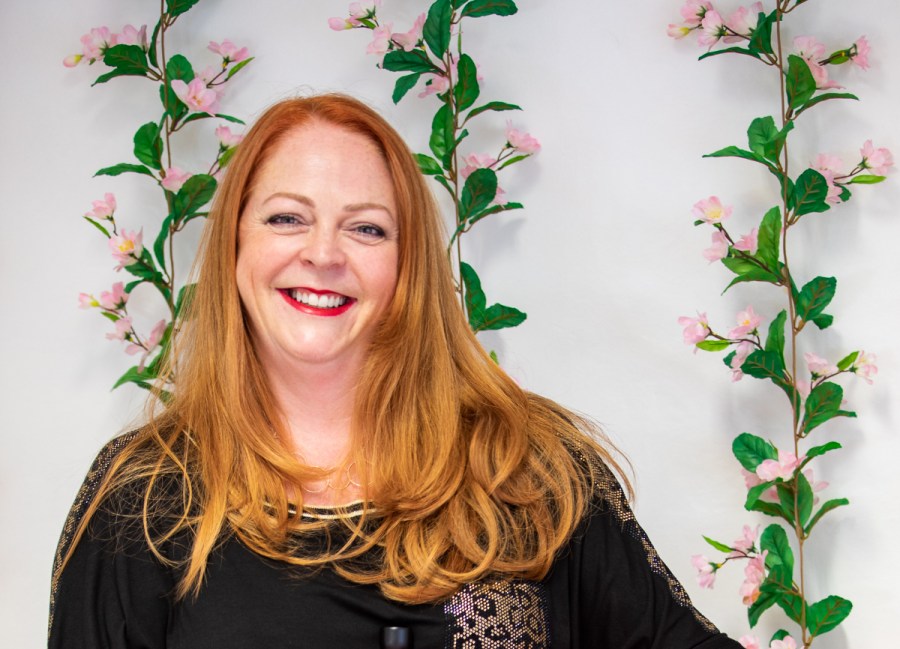Jenny Barling vividly recounts her experience of Premenstrual Dysphoric Disorder (PMDD) and how she has been inspired to help other women build their confidence and lead their best lives.
My menstrual cycle started when I was eight years old and I was put on the contraceptive pill at the age of thirteen because my mood swings were so dramatic. I didn’t know at the time but something was starting in me that was connected to my hormones.
PMDD or Premenstrual Dysphoric Disorder is a life-debilitating condition that I lived with for over 25 years. It stopped me from creating the life that I truly desired and deserved until I was finally, properly diagnosed at 38 and given a total hysterectomy at the age of 40.
I was told my PMDD symptoms were ‘just part of being a woman’
Throughout my teenage and adult life, my mood swings got worse. I was put on many different contraceptive pills by doctors and was told that it was just part and parcel of being a woman. I thought it was normal and that everybody else went through the same at that time of the month.
I would be able to feel the moods start, it was like someone flicking a switch and I would die a little inside every time because I knew that I couldn’t control what was happening to me and I knew what was coming. It sounds crazy, I know but I genuinely had no control over it.
As soon as my body would ovulate, halfway through my cycle, I would start to sink, and a dark feeling would come over me. It would get deeper and deeper and my brain became taken over with the darkest of thoughts. My throat would start to close and feel tight. I could feel it physically as well as emotionally.
PMDD brought on a deep depression each month
My body would literally fill from my toes to my head with a heavy, angry feeling. Deep depression would come, anger, rage, brain fog, confusion, lack of concentration. If things in life were generally good, then the effects were lighter but they were still there.
If I was in a bad place in a relationship or having a stressful time for example, the deeper I would go. The weird thing is that I could feel what was happening but I was trapped inside my own head and there was no way of escaping it.
I would start an argument for no reason and I would say to myself in my head, ‘what are you doing, just stop, you are completely overreacting, you are being irrational’ but nothing I said or did could stop it. I would start arguments in restaurants if something went wrong, I wouldn’t let it go, I had to keep fighting, it felt almost like a release.
PMDD caused extreme fatigue
During these weeks, I was intolerant to noise, touch, light, I would be confused and clumsy. I would find it hard to string a sentence together. I had extreme fatigue and sleep became my superpower, not only because I was exhausted but because the longer I slept, the less of life I would have to deal with. Simple tasks like putting a load of washing on were difficult.
I would feel paranoid that no one liked me and I believed that people were always talking about me which prevented me from forming strong group friendships. I would end relationships. I had very few, select friends who I can say are still amazing friends to me now. They knew and loved the real me and still do, thankfully.
If you said hello to me in the wrong way, I would feel like you hated me.
Most months I had suicidal thoughts
I had constant chatter in my head and self-hatred and utter rage about anything and everything. Most months I would have suicidal thoughts. The chatter inside my head would say, I just wish I was dead. I would drive along the road wishing that a lorry would plough into me and take my life so that I could escape myself.
It was such a strong and uncontrollable feeling.
I could never plan anything because I would never know how I would be feeling when the time came, so it was easier not to. The thought of someone saying to me, let’s book a holiday for next year or even in six months’ time would fill me with dread.
When my period came I was myself again
The effects got worse and worse until the day my period came, then it’s like the switch had been flicked again and hooray, it’s gone. Hello me again, just like that. I would spend that week of my period recovering from the exhaustion of the past two weeks and during the fourth week, before I ovulated again, I would be full of energy.
I would restart my gym routine and healthy eating, I would be so happy, I was like a superwoman. The washing was all done with ease, I would see friends, make plans, have a brilliant business idea, redecorate the house…. I would feel so good and those horrendous feelings would be a million miles away.
I would think, right, this month I will be fine, look at me now, I will not fall from this, this is ME and I loved being ME!! Then I ovulated, the switch had been flicked and bang, here we go again. Month after month, year after year, this life debilitating condition controlled my body and my mind. It makes me so sad writing this.
At last, I was diagnosed with PMDD
Over the years of suffering from my symptoms, I had tried all sorts of medication and therapies and I was finally diagnosed by chance with PMDD when I saw a specialist gynaecologist about being sterilised after I had my three children.
It was a really weird feeling because I felt like my whole life had been explained to me in that split second. I felt elated that what I was going through was actually ‘a thing’ and now there was a doctor who was willing to treat me.
I finally had validation that I wasn’t just a crazy lady who the doctors laughed at every time I asked them to remove my ovaries.
I had a hysterectomy at the age of 40
The definitive treatment was to be a total hysterectomy, including removing my ovaries, fallopian tubes, and cervix. I had this done at the age of 40 and it slammed me straight into menopause, which I embraced wholeheartedly and I happily treat with oestrogen and testosterone HRT.
It’s been a very long journey and after my operation, I actually went through a process of grief for my old life and from the PMDD. I had spent so many years battling, masking, and making coping mechanisms to get through the monthly ordeal and now that had all gone away and left me and I felt a bit lost but I had a fantastic man in my life who supported me through everything and still does.
Now I’ve got my life back
I feel like I have my life back and I can do things now that I could never have done with PMDD like, run my own successful business, hold down a strong relationship, and plan for the future. PMDD stopped me from being able to do all of those things.
Many women, as I did, get misdiagnosed with bipolar disorder because the ups are high and the downs are low but it happens on a monthly cycle.
PMDD was only recognised as an actual condition in 2017 and it is said that 2-5% of menstruating women suffer from it but I and many other sufferers believe this number is a lot higher.
Condition is different for everyone
There are varying degrees of this disorder and each person is different and every woman responds differently to different treatments. This is not PMT/S I am talking about, this is a life-debilitating condition that many women suffer with but they don’t know what it is.
I now talk openly and freely about my journey and many other women have had lightbulb moments, recognising this condition in themselves or in a friend or loved one, and have then gone on to re-claiming their lives.
Now I’m building a supportive community for women
Alongside my permanent makeup business, I run an amazing FaceBook community for ambitious women who want more. I help them realise that they don’t have to put up and shut up like I was made to for so long. I help them gain confidence and grow to be the women they deserve to be. It’s pretty powerful stuff.
You can connect with me on my page and group on FaceBook @jennybarling ~ @womeninthezone








